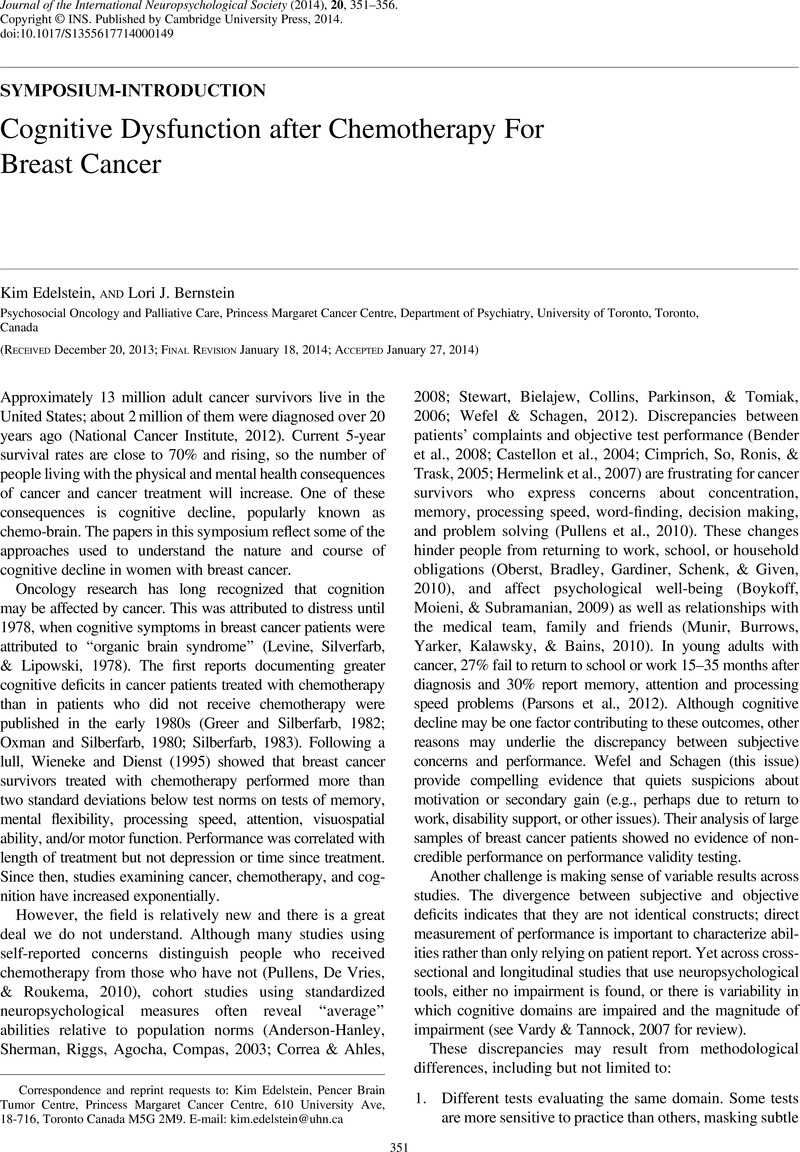Crossref Citations
This article has been cited by the following publications. This list is generated based on data provided by Crossref.
Edelstein, Kim
Coate, Linda
Massey, Christine
Jewitt, Natalie C.
Mason, Warren P.
and
Devins, Gerald M.
2016.
Illness intrusiveness and subjective well-being in patients with glioblastoma.
Journal of Neuro-Oncology,
Vol. 126,
Issue. 1,
p.
127.
Mackenzie, Michael J.
Zuniga, Krystle E.
and
McAuley, Edward
2016.
Exercise-Cognition Interaction.
p.
399.
Ulfers, Sara S.
and
Berg, Christine
2017.
Occupational Therapists With Oncology Exposure: Perceived Needs on Adults and Older Adults With Cancer-Related Cognitive Impairments.
OTJR: Occupational Therapy Journal of Research,
Vol. 37,
Issue. 3,
p.
149.
Bernstein, Lori J.
McCreath, Graham A.
Komeylian, Zahra
and
Rich, Jill B.
2017.
Cognitive impairment in breast cancer survivors treated with chemotherapy depends on control group type and cognitive domains assessed: A multilevel meta-analysis.
Neuroscience & Biobehavioral Reviews,
Vol. 83,
Issue. ,
p.
417.
Yao, Christie
Bernstein, Lori J.
and
Rich, Jill B.
2017.
Executive functioning impairment in women treated with chemotherapy for breast cancer: a systematic review.
Breast Cancer Research and Treatment,
Vol. 166,
Issue. 1,
p.
15.
Yao, Christie
Rich, Jill B.
Tirona, Kattleya
and
Bernstein, Lori J.
2017.
Intraindividual variability in reaction time before and after neoadjuvant chemotherapy in women diagnosed with breast cancer.
Psycho-Oncology,
Vol. 26,
Issue. 12,
p.
2261.
Fleischer, Anne
and
Howell, Dana
2017.
The experience of breast cancer survivors’ participation in important activities during and after treatments.
British Journal of Occupational Therapy,
Vol. 80,
Issue. 8,
p.
470.
Bernstein, Lori J.
McCreath, Graham A.
Nyhof-Young, Joyce
Dissanayake, Dilan
and
Rich, Jill B.
2018.
A brief psychoeducational intervention improves memory contentment in breast cancer survivors with cognitive concerns: results of a single-arm prospective study.
Supportive Care in Cancer,
Vol. 26,
Issue. 8,
p.
2851.
Li, Xiu
Chen, Haijun
Lv, Yue
Chao, Herta H.
Gong, Liang
Li, Chiang-Shan R.
and
Cheng, Huaidong
2018.
Diminished gray matter density mediates chemotherapy dosage-related cognitive impairment in breast cancer patients.
Scientific Reports,
Vol. 8,
Issue. 1,
Bernstein, Lori J.
Pond, Gregory R.
Gan, Hui K.
Tirona, Kattleya
Chan, Kelvin K.
Hope, Andrew
Kim, John
Chen, Eric X.
Siu, Lillian L.
and
Razak, Albiruni R. Abdul
2018.
Pretreatment neurocognitive function and self‐reported symptoms in patients with newly diagnosed head and neck cancer compared with noncancer cohort.
Head & Neck,
Vol. 40,
Issue. 9,
p.
2029.
Ringash, Jolie
Bernstein, Lori J.
Devins, Gerald
Dunphy, Colleen
Giuliani, Meredith
Martino, Rosemary
and
McEwen, Sara
2018.
Head and Neck Cancer Survivorship: Learning the Needs, Meeting the Needs.
Seminars in Radiation Oncology,
Vol. 28,
Issue. 1,
p.
64.
Saeed, Omar
Bernstein, Lori J.
Fazelzad, Rouhi
Samuels, Mary
Burmeister, Lynn A.
Thabane, Lehana
Ezzat, Shereen
Goldstein, David P.
Jones, Jennifer
and
Sawka, Anna M.
2019.
Cognitive functioning in thyroid cancer survivors: a systematic review and meta-analysis.
Journal of Cancer Survivorship,
Vol. 13,
Issue. 2,
p.
231.
Natale, Gianfranco
and
Bocci, Guido
2020.
Brain and Heart Dynamics.
p.
765.
Tao, Longxiang
Wang, Lu
Chen, Xingui
Liu, Fujun
Ruan, Feiyan
Zhang, Jingjie
Shen, Li
and
Yu, Yongqiang
2020.
Modulation of Interhemispheric Functional Coordination in Breast Cancer Patients Receiving Chemotherapy.
Frontiers in Psychology,
Vol. 11,
Issue. ,
Natale, Gianfranco
and
Bocci, Guido
2020.
Brain and Heart Dynamics.
p.
1.
Bernstein, Lori J.
Edelstein, Kim
Sharma, Alisha
and
Alain, Claude
2021.
Chemo-brain: An activation likelihood estimation meta-analysis of functional magnetic resonance imaging studies.
Neuroscience & Biobehavioral Reviews,
Vol. 130,
Issue. ,
p.
314.
Abraham, Eleenor H
Khan, Bilal
Ling, Erick
and
Bernstein, Lori J
2022.
The Development and Evaluation of a Patient Educational Resource for Cancer-Related Cognitive Dysfunction.
Journal of Cancer Education,
Vol. 37,
Issue. 1,
p.
111.
Onzi, Giovana R.
D’Agustini, Nathalia
Garcia, Solange C.
Guterres, Silvia S.
Pohlmann, Paula R.
Rosa, Daniela D.
and
Pohlmann, Adriana R.
2022.
Chemobrain in Breast Cancer: Mechanisms, Clinical Manifestations, and Potential Interventions.
Drug Safety,
Vol. 45,
Issue. 6,
p.
601.
Mayo, Samantha J.
Edelstein, Kim
Atenafu, Eshetu G.
Ajaj, Rand
Li, Madeline
and
Bernstein, Lori J.
2024.
Cognitive Symptoms Across Diverse Cancers.
JAMA Network Open,
Vol. 7,
Issue. 8,
p.
e2430833.
Amani, Omid
Mazaheri, Mohammad Ali
Moghani, Mona Malekzadeh
Zarani, Fariba
and
Choolabi, Rasool Hamidi
2024.
Chemotherapy‐induced cognitive impairment in breast cancer survivors: A systematic review of studies from 2000 to 2021.
Cancer Reports,
Vol. 7,
Issue. 2,



